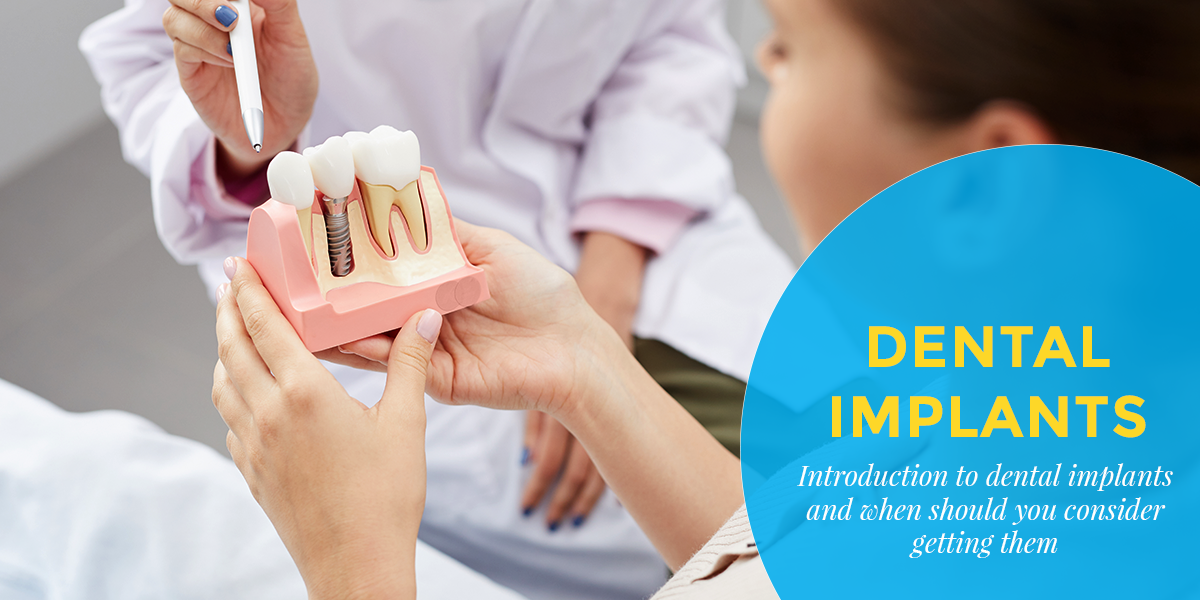Dental Implants are slowly becoming the preferred procedure in replacing missing teeth, and it is safe to say that when implants are done by a professional and well-experienced dentist, dental implants are one of the safest and best procedures in dentistry.
What is a dental implant?
For more than 30 years, Dental Implants have been used as one of the strongest supports for teeth replacement. Dental implants replace tooth roots, providing a permanent foundation for a replacement tooth that matches your natural teeth. Even if dental implants are scary looking, it stimulates bone growth as it preserves the natural bone structure.
Dental Implants are made of three parts:
- Screw
- Abutment/Connector
- Crown
The screw is first placed into the jawbone and become the base support for your crown. The abutment serves as the connector of the implant and the crown. Then, the crowns or the custom-made teeth is placed.
The bond of the screw to the natural bone of the jaw gives the stable support for the crown. The crown won’t shift or slide in your mouth when you eat or speak.
However, dental implants are not for everybody. Adolescents and children who are still developing physically are not suitable patients for implants because of the density of their bone structure. Typically, people who have lost their teeth through trauma, decay, failed root canal treatment, fractured teeth or have congenitally damaged teeth can use dental implants to enhance their teeth.
Advantages and Risks of Dental Implants
Dental Implants do not only impact the aesthetic look of your teeth, it also affects your oral health completely. Below are the advantages of Dental Implants:
- Overall Health – Since dental implants are not supported by other teeth, most of the original teeth are left intact and unaffected which improves your overall health. Implants also preserves the teeth’s natural bone structure.
- Durability – With proper care, dental implants are very sturdy and lasts a lifetime. It also lasts longer than other treatments like dentures and bridges.
- Better Confidence – There is no doubt that implants improve the look and feel of your teeth, affecting your total confidence and self-esteem. A fixed implant also removes the discomfort of removable dentures.
- Convenience – Since implants are fixed, it’s very convenient and easy to keep them in place. No more messy adhesives and misplaced dentures.
- Speech and taste improvement – Eating, tasting and speaking becomes a worry for a removable teeth replacement. Dental implants act as a replacement for your own tooth, allowing you to speak and eat comfortably, without the fear and pain of your teeth slipping or moving. Implants also improve taste and temperature perception.
Like any other treatment, risks are also present in Dental Implants:
- Infection – Similar to other surgeries, infection may occur in dental implants. The mouth acquires a lot of bacteria and if the surgical site becomes infected, it can compromise the treatment duration and outcome. With prescribed antibiotics, appropriate use of mouth rinses and sterile surgical technique, a patient can counter the effects of infection.
- Inferior Dental and Lingual Nerve Damage – Inferior Dental and Lingual Nerves are major nerves in the lower jaw that supply sensation to the lower teeth, lower lip and tongue. Proper assessment and positioning of these nerves are viewed through digital radiographs, CT scans and iCAT scans to prevent direct trauma to these nerves. The nerves can recover from either partial or complete numbness caused by this trauma. On the other hand, Tingling (Paraesthesia) is considered as an indirect trauma caused by inflammation around the surgical site. This can recover once inflammation has subside.
- Damages to Adjacent Teeth – Same with nerves, teeth and blood vessels adjacent to the implant site are assessed using digital radiographs, CT scans or iCAT scans to review positioning and prevent damage before an implant surgery. However, there are some cases where the implant causes damage to adjoining teeth roots.
- Implant Failure – Failure can still occur regardless of the skill, care and experience of the dentist and the patient’s care and attention to the installed implants. There are many factors attributing to the patient’s implant success. If the implant fails, it needs to be removed so the bone and soft tissue can repair itself. Once healed, an implant may be possible again.
- Sinus Involvement – When the sinus floor drops down to the posterior region of the upper jaw, the amount of available bone is reduced, and the sinus can be affected in the implant procedure. If the sinus appears to be too close to the implant location, the situation needs to be improved first before the implant placement.
- Aesthetics and Gum Profile – Some metallic components may become visible due to gum recession which naturally occurs in the ageing process. Oral hygiene can also aid in minimising recession.
- Smoking – Recent studies show that the failure rate may be as high as 38%. No responsibility can be taken if you smoke.
Dental Implants Checklist
The success of dental implants depends on a few factors. Here are some of the requirements for patients who wish to undergo Dental Implants:
- Adequate bone support – Since the implant is fused into the jawbone, the quality and density of the bone is important. A fully developed jaw structure is needed.
- Healthy gums – Having healthy gums is critical to the whole process of placing implants. Patients with gum diseases often experience implant failure.
- Good overall health – Implants are considered as a surgical procedure so patients must be in their best health. Patients who are suffering from severe heart disease, uncontrolled diabetes, immunosuppressant, psychiatric disorders, osteoporosis and cancer or patients who undergo radiation therapy in the neck/head area may have a lower implant success rate. Same goes for patients who are heavy smokers or alcohol drinkers.
- Commitment to oral health – Implants, same with other treatments, need oral hygiene. Brushing, flossing and regular 6 monthly dental visits are vital to the success of the treatment.
Dental Implants Procedure
Dental Implants requires careful treatment planning and execution in a longer period, as compared to other treatments. Depending on a patient’s case, the procedure may undergo for 6 months to 1 year before completion.
1. Treatment Planning
The Treatment Planning process is conducted with patient interview, review of medical history, clinical examination, intra-oral and extra-oral photographs, impressions for study models, diagnostic imaging with digital radiographs, CT scans or iCAT scans, radiographic guide construction and 3D computer modelling of the patient’s jaws.
As the first step in getting Dental Implants, the patient will undergo an initial consultation for the creation of a personalised treatment plan. The patient will be assessed if they are qualified for the treatment by measuring overall medical health, psychological conditions, oral and social habits; availability of bone and soft tissue; available space and the relationship of the teeth and jaws; and patient expectations.
A Cone Beam 3D Scan (Cone Beam Computed Tomography) assesses the area if there is enough bone level at the implant location. If your dentist believes that your bone is too soft or thin to keep the implant in place, your dentist may recommend placing a bone graft. If your bone is considered strong enough to support your implant, an extraction will be done.
2. Implant Placement
After assessing the bone structure and creating the personalised treatment plan, the implant is then placed to the area. Under local anaesthetic and strictly sterile conditions, the titanium screw is placed into the jawbone via an incision in the gum. Digital radiographs will be taken during this procedure to confirm positioning.
3. Abutment Placement
Depending on the stability of the implant at this stage, the Abutment may be placed directly on the implant which eliminates the need for Stage 2 surgery. If the abutment is not instantly positioned and the implant is exposed, a different healing abutment is placed on the implant – allowing the area to heal prior to the placement of final restoration. Occasionally, soft tissue manipulation with temporary prosthesis is required before proceeding to the definitive restoration. Once again, digital radiographs will be taken to confirm healing.
After placing the abutment, an information sheet containing pre and post-operative instructions will be provided. A post-operative review appointment will be scheduled for 10 to 14 days after the surgery to remove stitches and observe healing. The healing period required for Osseo-integration is usually 3 to 6 months.
Subsequently, an accurate impression of the jaw is taken for the creation of the crown. It usually takes 3 weeks to put the final crown or bridge.
4. Crown Fitting
The final stage where the crowns are successfully placed onto the Dental Implants. This will be reviewed after a month and should be checked regularly every 6 months.
View the full timeline here.
Are dental implants painful? How successful are dental implants?
During the implant placement procedure, a local anaesthetic will be used for pain relief. After this, you may feel some discomfort for a week following the surgery.
Dental Implants are safe and has high success rates depending on each individual. Varying from every circumstance, the success rate in the lower jaw may be as high as 98%, and 90-95% in the upper jaw. Success rates are lower further back in the mouth, as bone quality and quantity are not as good, but generally the chances of a successful outcome are over 90%.
We urge every patient to take care of their implants by going to regular maintenance appointments to avoid implant failure. Aside from regular appointments, factors such as oral hygiene and maintenance regimes, periodontal disease, occlusion and tobacco use affect the success of implants. Patients who smoke are strongly encouraged to stop smoking at least 3 months prior to implant placement because it is a major risk factor in implant failure. It’s important to bear in mind that each patient is different, making it impossible to predict how long a dental implant will last. When neglected, implants may cause a lot of risks in the same case as a normal teeth.
MS Dental, your family dentist in Cardiff & Singleton
MS Dental offers an obligation- free consultation for Dental Implants. To know more about our services and offers, send us a message:


















Leave a Reply